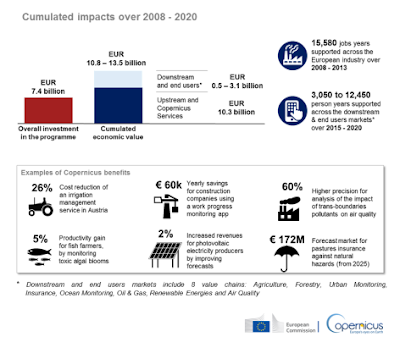Thursday 26 January 2017
Environment and Planning B - Paper now available online
Our paper, "Data imputation in a short-run space-time series: A Bayesian approach" in Environment and Planning B demonstrating a methodology for imputing missing values in population statistics is now available online.
See the Sentinel 2b launch
Interested in Remote Sensing and Earth Observation? Want a seat at mission control in Darmstadt for the Sentinel 2b launch? Have a strong social media presence?
Enter here
Application deadline is February 1st!
Enter here
Application deadline is February 1st!
Monday 23 January 2017
Time for some good climate change news
Yes! I see a positive headline on the RTE News main page. After years of depressing climate change news and months of depressing political news it most certainly is time Will, I'll have some of that!
...click...
Unfortunately it turns out the main page article link is slightly misleading, and Will is also hoping that after years of depressing climate change news and months of depressing political news, it is time someone had some good news about climate change. So no good news...
COST Action reviews
COST Actions are an excellent way to meet other people in your discipline. I am a member of one, ES1309 Optimise which combines satellite and RPAS data for field measurements of fluorescence. I have acted as external evaluator reviewing COST actions proposals in the past and have recently been asked to review another, which brings me to the topic of this post. We all work in quite a specialist area - there are not hundreds of coastal remote sensers in Ireland. A COST action is an invaluable way for me to network with others in this field around the EU, but by agreeing to review the proposal I am precluded from having anything to do with that COST action from then onwards - which could be quite detrimental to collaboration.
From the T&Cs:
"Independent External Experts having evaluated a proposal may not participate in the Action deriving from that proposal."
I understand that this excludes you from being the national rep on the management committee, but would it also exclude you from attending any workshops or conferences they organise throughout the action? Collaborating on a paper? Considering these are voluntary reviews it is quite prohibitive - i'll have to think it through before accepting this new request.
Additionally - something that was quite confusing the first time and lead to alot of back and forth, conflicts of interest arise if you have:
"a professional or personal relationship with a proposer."
Again - in such a specialised field and for a proposal from EU academics, you are almost certain to know one or all of them in your field. However the proposal does not list the applicants - so how do you judge? COST clarified it for me in the following statement last time:
"..as long as you do not identify a participant in a proposal you evaluate (or have a strong assumption on the identity of a participant) you may proceed, there is no conflict of interest."
From the T&Cs:
"Independent External Experts having evaluated a proposal may not participate in the Action deriving from that proposal."
I understand that this excludes you from being the national rep on the management committee, but would it also exclude you from attending any workshops or conferences they organise throughout the action? Collaborating on a paper? Considering these are voluntary reviews it is quite prohibitive - i'll have to think it through before accepting this new request.
Additionally - something that was quite confusing the first time and lead to alot of back and forth, conflicts of interest arise if you have:
"a professional or personal relationship with a proposer."
Again - in such a specialised field and for a proposal from EU academics, you are almost certain to know one or all of them in your field. However the proposal does not list the applicants - so how do you judge? COST clarified it for me in the following statement last time:
"..as long as you do not identify a participant in a proposal you evaluate (or have a strong assumption on the identity of a participant) you may proceed, there is no conflict of interest."
Tuesday 17 January 2017
MarTERA cofunded (ERA-NET) 2017
The call for collaborative research projects in different areas of maritime and marine technologies is out - deadline for initial proposals is 31st March.
Wednesday 11 January 2017
Mapping Shadows
Another example of someone using data that I usually tidy or throw away. This is a map of the shadows in satellite imagery, rather than the features that cause the satellites. Rather than as research this PhD student is using the sales of these images (as art) to fund their PhD!
Saturday 7 January 2017
Copernicus Market Report
This first Copernicus market report was released just before Christmas - promising significant savings accruing from the use of satellite data. Of particular interest to my colleagues at the SCSI and RICS will be the construction company savings through a "work progress monitoring app" (page 48 - building RADAR) and savings on insurance (Page 49). I must find out more about those...
Wednesday 4 January 2017
Finding aircraft in satellite imagery
An interesting study here on using satellite imagery to find aircraft. I have noticed them quite often in imagery we were using for coastal studies in Dublin bay (and therefore the approaches to Dublin airport - one of the busiest in Europe) but usually look on it as an error or 'noise' rather than the source of my study. The plane usually shows up as a superman-like blur in Red, Green and Blue due to imaging delays between the subsequent bands and the moving target (or possibly also due to elevation differences with the terrain underneath when creating the ortho).
They compare swath width and spectral resolution for Landsat and Sentinel to see which is best - I must give it a look for Dublin sometime.
Tuesday 3 January 2017
Google Earth Engine
I like new cars, but hate buying new cars because they decrease in value so quickly - hence my trusty Corolla. Similarly - I like new PCs. but hate buying new PCs, as they get slow and clunky very quickly. As data sizes increase, we are soon left staring at progress bars for hours. Ok - you can move everything onto a server like we have with some old hardware in our computer room for the slick mapping/Sentinel 1 analysis and leave things processing in the background - but these are still computers in effect, sitting in our lab, ageing. So one thing I am keeping an eye on is cloud processing - which although costly at present has great potential to cut down on hardware costs and always gives you the processing power you need. Google to the rescue once again - with Google Earth Engine (python and java friendly) can be used directly with QGIS for processing and also hosts most if not all of the Landsat and Sentinel archives already.
Dáire recommended it to me a few months back but I was too distracted to sign up - however i have remedied that now and I've signed up to be a 'trusted tester'. I will start bringing this into my research and lecturing and see how I get on if I get approved.
Sunday 1 January 2017
Barlogue
Some beautiful UAV footage of Barlogue Creek and Lough Hyne that I came across online. I did my PADI Open Water diver tests in that channel in 2007. It wasn't that clear on the day, as we had had one of the wettest summers on record and all the run off had made the water very turbid. Still - some of my favourite spots in the country are around here. The clarity of the water provides some tempting sites to look at for optical bathymetry tests.
Subscribe to:
Posts (Atom)
About Me

- Conor
- My name is Conor. I am a Lecturer at the Department of Geography at Maynooth University. These few lines will (hopefully) chart my progress through academia and the world of research.






